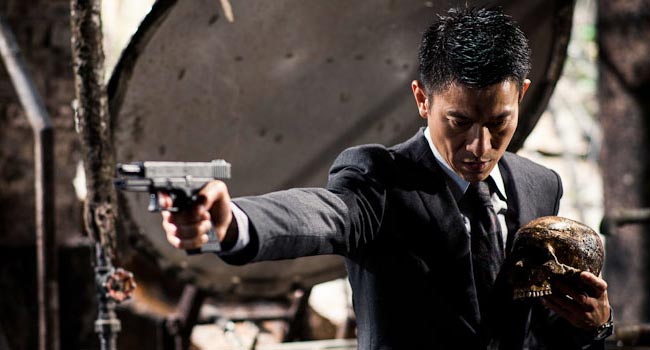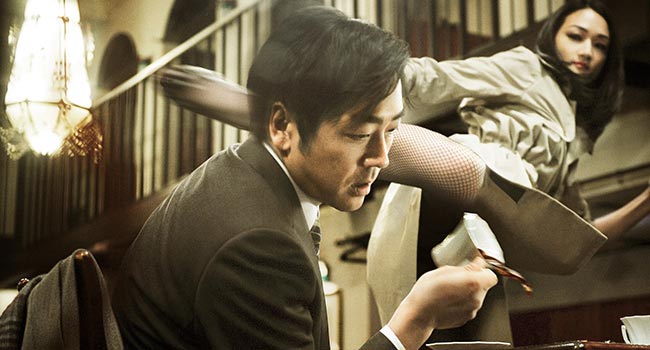TIFF 2013: Blind Detective, Why Don’t You Play In Hell?, R100

Blind Detective

On my second-last day of the festival, I was not expecting to have one of the craziest days I’ve ever had at TIFF in my six years of going. Starting off, I was getting ready for one of my more anticipated films at the festival. Blind Detective is the latest film by Johnnie To, whose film Drug War is one of my favourites this year. Having been a fan of To’s work for years, I had an idea of what I was getting into. His style usually has scenes play out without any establishment or set-up, with the details usually being filled in after the fact. It can be confusing, and To’s no-nonsense pacing means that you have to keep up in order to follow along with everything going on.
Nothing could prepare me for what did come though. To’s tricks are still here, but he’s never thrown so much at the camera before. Johnston (Andy Lau) is the title detective, a former cop who lost his sight and now spends his days solving old cases to collect reward money. After unknowingly helping police bust a criminal, detective Ho (Sammi Cheng) asks him for help. She’ll pay him to help find out what happened to a childhood friend of hers who vanished years earlier, and he’ll show her how to become a better detective.
Johnston turns out to be rather unlikable, usually using Ho’s physical prowess to help him solve other crimes he’s investigating while tricking her into thinking they’re related to her case, but Ho expectedly falls for him. Watching them go around re-enacting various crime scenes (Johnston’s strategy is to re-live the crime scene, which mostly translates to physically harming Ho repeatedly) is funny, and soon the entire thing feels like one of the most deranged romantic comedies ever made. To uses plenty of physical humour and slapstick which, combined with the very Parisian score, brings Jacques Tati’s films to mind.
While To isn’t that good, he’s still a master at entertainment and it shines through here. The assortment of subplots, eccentric characters and plot twists that come barreling through (including a deranged lovesick grandmother, a murderous gambler and a love quadrangle to name a few) almost sink the film by the end, but To manages to handle most of them with ease. Cheng and Lau’s chemistry is great, and it’s nice to see To doing something more light-hearted in tone even if the material is incredibly dark. The overstuffed plot and 2+ hour runtime make this one of To’s minor works instead of a classic, but even second-tier To is a hell of an entertaining time.
RATING: 7.2
Why Don’t You Play In Hell?

Following that was Why Don’t You Play In Hell?, the latest feature from Japanese madman Sion Sono. With Blind Detective I was taken back by the eccentric qualities of it since it was so unlike To, but Sono is a different story entirely. He’s directed gems like Suicide Club, the 4-hour Love Exposure, S&M drama Strange Circus and the nutty serial killer tale Cold Fish. It’s been over 2 years since Sono’s made a genre film, he made 2 dramas about the massive earthquake and tsunami since Guilty of Romance, but he’s more than made up for lost time here.
Somehow Sono manages to top himself here, going all-out with what looks like everything he can think of. The film starts with two different storylines: One involving wannabe teen filmmakers called The Fuck Bombers, and the other focusing on a long-standing feud between rival Yakuza gangs. Giving away specific details would ruin most of the film’s fun, as the story is so convoluted and filled with connections that it’s fun to see the surprises in store (I usually hate when a film flashes back to an earlier scene to force an audience to see how things are connected, but their use here is absolutely vital given the information overload).
Once the two plots merge, it leads to a massive sequence that’s hilarious in its gleeful bloodlust and self-awareness. It’s the kind of sequence that would make Tarantino proud, and I’m certain that if he gets a chance to see Why Don’t You Play In Hell? he’d be a huge fan. The meta elements and Sono’s general goofiness sometimes drown out everything else going on in the film, usually in a bad way, but when everything comes together it provides some huge laughs and some of the most ridiculous moments in cinema this year. With Stateside distribution acquired by Drafthouse Films, Why Don’t You Play In Hell? might finally be Sono’s breakthrough for Western audiences. If so, it’s a great place to start. Despite everything going on, it’s by far his most accessible film in ages.
RATING: 7.3
R100

Finally, I sat down to catch R100, yet another title playing in Midnight Madness this year. I was a big fan of Symbol, director Hitoshi Matsumoto’s previous film that played at TIFF. Like Symbol, R100 takes its sweet time to get going. A wimpy-looking businessman (Nao Omori) discovers a club called Bondage, which offers him the ultimate pleasure in S&M: For one year, different dominatrices will randomly appear in his day-to-day life and publicly beat and/or humiliate him. He signs the contract, and things go well for a while until the group starts getting involved with his family and career. The businessman tries to end the contract, but in doing so he discovers just how dangerous and life-threatening this club really is.
It takes a while before Matsumoto drops a meta element into the film that explains its title (some necessary background: the Japanese rating system goes by R15, R18, etc. to bar certain age groups from seeing a movie). The film is directed by a 100 year old man who insists that only people his age will truly understand what’s going on in it. The scenes where a group of people (ratings board? producers? distributors? The film never really explains who these people are exactly) deconstruct the film provide some of the biggest laughs, and the same goes for Matsumoto’s cameo as a cop who calls out the absurdity of the S&M lifestyle, but that’s kind of it in terms of major laughs.
Matsumoto’s sense of humour can just be far too strange to really enjoy sometimes, leaving me staring blankly at what he’s doing. The way he messes with expectations and form is admirable, and his repetitive editing make for a few funny moments (my favourite being the arrival of Bondage’s CEO, a massively tall American woman who introduces herself by repeatedly belly flopping into a pool), but I really could not get into a lot of what he was doing in R100. It makes for a hit and miss experience, with some scenes so singularly strange that I wish it could have worked out much better than it actually did.
RATING: 6
Next up:
My final TIFF 2013 report, with three films left to go: Cannes favourite Stranger by the Lake, Kim Ki-Duk’s latest attempt at total depravity, and Un Certain Regard winner Omar.
